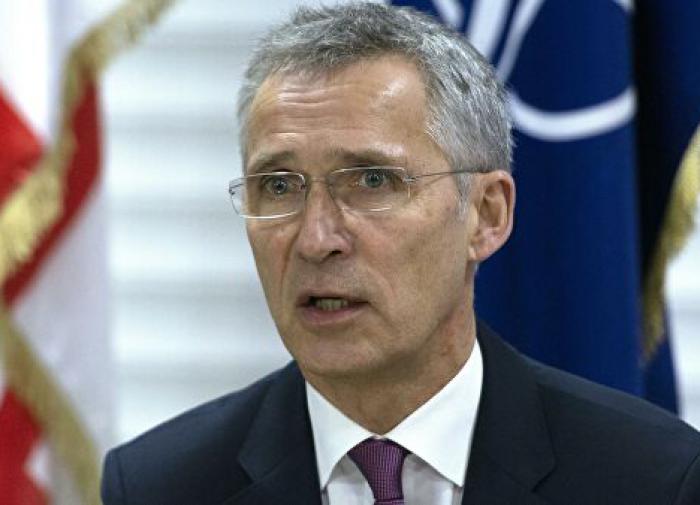Putin only needs to give Stoltenberg one look for NATO future to get clear
Following the summit in Riga on November 30, NATO Secretary General Jens Stoltenberg explained how the alliance could respond to Russia's 'new aggression against Ukraine.'

Stoltenberg: How NATO can respond to Russia in Ukraine
The summit of foreign ministers of NATO member states was held in Riga, Latvia, on 30 November.
Ukraine urged NATO to prepare economic sanctions against Russia if Moscow should the latter "choose the worst-case scenario." In addition, Kiev asked NATO to intensify its military cooperation with Ukraine.
"We call on our allies to join Ukraine in developing a package of containment measures," Ukrainian Foreign Minister Dmitry Kuleba told reporters after arriving in Riga for talks with NATO foreign ministers.
"We hope that if we join forces, if we act together, we will be able to restrain President Putin and demotivate him in choosing the worst-case scenario of events — a military operation that is," Kuleba said.
NATO members are united in their intentions to hold Russia from war
NATO Secretary General Jens Stoltenberg later told reporters what NATO decided.
He said that the alliance was calling on Russia to "resume dialogue" "in the name of peace and security" within the Russia-NATO Council.
The secretary general also noted that the defense ministers of NATO countries discussed in detail "the Russian military buildup near the borders of Ukraine."
"The situation in and around Ukraine remains fluid and unpredictable. There is no certainty about Russia's intentions. We see a significant and unusual concentration of forces, which is unjustified and unexplained. And accompanied by heightened rhetoric and disinformation. And we know that Russia has used force before against Ukraine and other neighbours. Today, Ministers discussed the situation. We stand united in our aim to deter Russia from any further aggressive actions," Jens Stoltenberg said.
As for the instruments of containment, he pointed out that combat ready troops had been deployed in the eastern part of the Alliance.
"And this deployment of troops in the eastern part of the Alliance, including the Black Sea, not only in the Baltic region, was a direct response to Russia's aggressive actions against Ukraine," the secretary general said.
When reporters started persistently asking Stoltenberg to clarify whether there could be a military, but not just a political or economic response, Stoltenberg said that NATO was providing real support to Ukraine:
"We provide support to Ukraine. Political support, practical support, Allies provide training, capacity building, and also military capabilities, equipment. And this is real support," Stoltenberg said.
"And this increases the threshold for Russia to conduct military aggressive actions against Ukraine, to once again conduct an incursion into Ukraine. Because to strengthen the armed forces of Ukraine is a way to help them to conduct their sovereign right for self-defence. I was in Odessa, where NATO instructors, experts help them in creating the naval potential of the Naval Academy,” Stoltenberg stated.
NATO needs to be vigilant and be present. The alliance needs to analyse intelligence data to continue to assess what else needs to be done, he said.
Ukraine does have a chance to join NATO, but a consensus is needed
NATO Secretary General said that the ministers would discuss the next Strategic Concept of the alliance, which would be adopted at the Madrid summit next year.
One of the aspects of this concept is globality through cooperation with geographically distant countries (Australia, South Korea, Colombia, etc.), rather than through new members.
Stoltenberg noted that NATO, within the framework of the decision of the 2008 summit in Bucharest, did not refuse to accept Ukraine to NATO. However, to become a member of NATO, you have to meet NATO standards, and there has to be a decision by 30 Allies, Stoltenberg said.
Russia does not interfere, she will simply respond
Russia has neither the right to veto, nor the right to interfere in this process.
Russia does not interfere, but she will respond. Russian President Vladimir Putin previously noted that Russia would be forced to act if NATO missiles capable of striking Moscow in mere minutes were deployed in Ukraine. It remains unclear what kind of response it would be, but if Putin and Stoltenberg met, Putin would only need to give Stoltenberg one look so that NATO chief could understand everything.
Subscribe to Pravda.Ru Telegram channel, Facebook, RSS!


